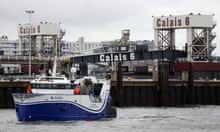The UK and Jersey governments have issued further licences to French fishing boats to trawl British waters in an apparent attempt to ease cross-Channel tensions.
The Brussels-imposed deadline of midnight on Friday for solving the post-Brexit fishing row passed without an agreement being announced.
However, the British government has since confirmed that talks on Friday evening between the environment secretary, George Eustice, and Virginijus Sinkevičius, from the European Commission, after “several weeks of intensive technical discussions on licensing”, resulted in more small-boat licences being granted.
In a statement, a spokesperson said 18 more licences had been granted to replacement vessels that had been able to present “new evidence” of having previously fished in British waters, with seven more boats under consideration. Jersey had granted permanent licences to an additional five vessels, they said.
France had threatened to press the E U to instigate legal action and trade restrictions against the UK if there was not a “sign of goodwill” in the fishing wrangle before the midnight deadline set by Brussels.
It is unclear whether the UK’s latest licences offer will satisfy the French government’s definition of a “gesture of good faith” in the talks.
On Friday, France’s European affairs minister, Clément Beaune, suggested the deadline could be extended as long as the UK offered “a few dozen extra licences” to show that “the dialogue is bearing fruit”.
The UK said it considered the latest phase of negotiations to be closed.
The fishing row – which had involved French fishers blocking British access to ports on the continent – centres on licences to trawl in UK and Channel Islands waters under the terms of Britain’s post-Brexit trade deal with the EU, the Trade and Cooperation Agreement (TCA).
The main source of contention is the number of licences to fish in waters around the British coastline for smaller French vessels that can prove they operated there before Brexit.
France says the UK has not handed out enough licences to its fishers, while the British government has insisted that applications have been granted to those who have the correct documentation.
Before Saturday’s announcement, there were thought to be approximately 100 outstanding licences, from France’s perspective.
A UK government spokesperson said it had adopted an “evidence-based approach” and that where fishing data had not been provided, “licences have not been issued”.
Providing details of the decision to grant more fishing licences, they added: “On direct replacement vessels, we have taken an approach in line with the TCA which provides stability and ensures the sustainability of our fisheries.
“Last night, following receipt of new evidence from the [European] Commission, the UK licensed 18 replacement vessels on the basis of this methodology. Further technical work on seven more licences for direct replacement vessels is scheduled to conclude on Monday.
“Jersey has today announced that it can, following receipt of new data this week, issue permanent licences to an additional five qualifying vessels currently on temporary licences. This will take the total permanent licences issued by Jersey to 130.
“This now concludes this phase of intensive talks on licensing.”
Officials said the process of issuing licences had been based on “evidence rather than deadlines”, with talks continuing into next week.
They stressed that the UK and the crown dependencies had “gone to great lengths to help vessels prove” their historical fishing activity, including purchasing commercially available electronic positioning data.
To satisfy UK criteria, vessels need to prove that they have fished in UK waters for one day in each of the four years between 2012 and 2016, while Guernsey and Jersey ask for evidence of fishing for more than 10 days in one year of the above period.









